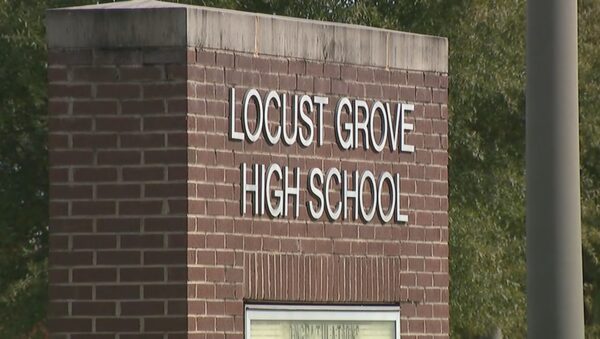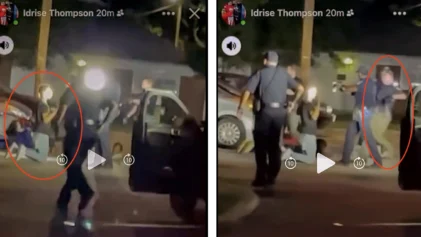A male student was suspended after he hit a female student for calling him a racially derogatory name. Students organized a protest centering around the school official’s inequitable decision to discipline only one party in the incident, prompting the school to eventually punish the teen who instigated the conflict by calling the boy the “n-word.”

Local news report states administrators at Locust Grove High School in the Atlanta suburb of Henry County are investigating an altercation on campus grounds that resulted in a child being assaulted. The boy accused of striking the girl involved in the incident was immediately punished. However, students and parents say the girl, who’s white was not punished. Neither teen’s name has been made been public because they are minors.
The incident was captured on camera and circulated on social media. The video shows the female student call a Black male student the n-word. The male student comes within frame and slaps her before another student pulls him away.
Layla Moreau, an African-American senior at the school, organized her peers to execute a peaceful walk-out on Thursday, where they chanted “Black Lives Matter,” believing the school treatment of the incident was coated with racial overtones.
They argued both students were wrong and should have received the same punishment. They say the female student was allowed to go to her class while the boy was sent home.
A school district representative said both students were disciplined, but provide no details of the punishment or whether both students were disciplined at the same time.
“We can’t share disciplinary action for students due to student privacy. Both students were disciplined based on their code of conduct infractions. School leaders have been working with and listing to any students who needed to express their feelings or concerns on the matter.”
Moreau addressed what she believed was unfair, “She got to go to class and have her education, while he had to leave. He was only defending himself.”
She continued saying she also has been called the “N-word” in school, further expressing the need for the school to step in and protect her and her classmates’ civil rights.
In some places, weaponizing the N-word can result in a person being hit with serious punitive penalties. In 2013, a New York jury awarded Brandi Johnson, 38, $280,000 after her Puerto Rican boss created a hostile work environment by calling her the N-word repeatedly during an offensive rant in the office.
The federal trial placed a legal microscope on the derogatory use of the word. During the case, Johnson said she hoped the favorable verdict she received showed the use of the word should not be “tolerated,” by anyone regardless of race.
Moreau hopes with the protest she was able to convince others using the slur in her learning environment is something that should not be tolerated.
“I just want some change,” she said. “I’m just tired of the inequality in the school.”
In an interview with Alive 11, she said does not feel safe as a person of color attending the predominately white school.
“We decided to take action against it because this is not the first time at that school or a school in Henry County,” Moreau said.
“It shouldn’t be two different treatments,” Moreau said. “Give the same treatment for everybody and not based on their skin color.”
The 12th grader said her goal is to create safe spaces and programming for her peers to talk about how racism impacts them in their young lives. She also doesn’t understand why racism is still raising its ugly head in 2022.
“It makes me feel bad because I don’t understand why is it that way? I love everybody. I don’t understand why everybody can’t just love each other.”
A representative from the Henry County School district, which oversees the LGHS said they were aware of the “matter involving a student using highly inappropriate/offensive and unacceptable language toward another student, which then resulted in an altercation.”
“We cannot state strongly enough how these types of behaviors are not and will not ever be tolerated in Henry County Schools,” the statement continued. “We are still gathering information pertaining to the matter, but students involved in this incident will be held accountable and appropriate discipline will be issued. Again, we cannot overstate how unacceptable this is and how disappointed we are in these actions.”
The school officials said the faculty at the campus “were able to meet with students on Thursday in a very productive and positive way for students to express their feelings,” promising to have an open door for those who need to talk about the incident as needed.
This is not the first time a high school in the 200-year-old county just south of Atlanta has been in the headlines regarding the flagrant use of the word.
In December 2021, hundreds of students demanded teachers to be dismissed from a Luella High School teacher for using the offensive slur. Students protested making the teachers’ actions known to the school’s superintendent’s office.
The office of Superintendent Mary Elizabeth Davis, who administers over fifty schools, said at least two teachers have been disciplined for the “highly inappropriate and unacceptable word choices.”
In a statement released about the improper conduct used around the students, a spokesperson wrote, “Employment action has been taken against the employees, and while we cannot go into further details about any teacher discipline as the information is protected by law, Henry County Schools in no way, shape, or form condones the actions that have been alleged, and that is why a thorough investigation was called for to get to the bottom of the matter.”
In both incidents, at LGHS and LHS, the youth-activated protests consisted of all races. Blacks, whites, and other races stood side-by-side to eradicate the use of the word.


